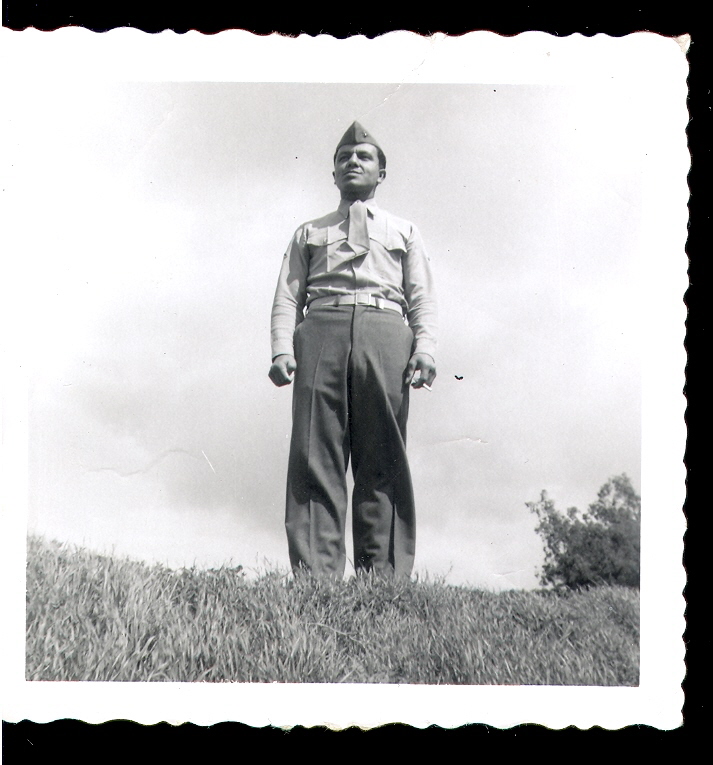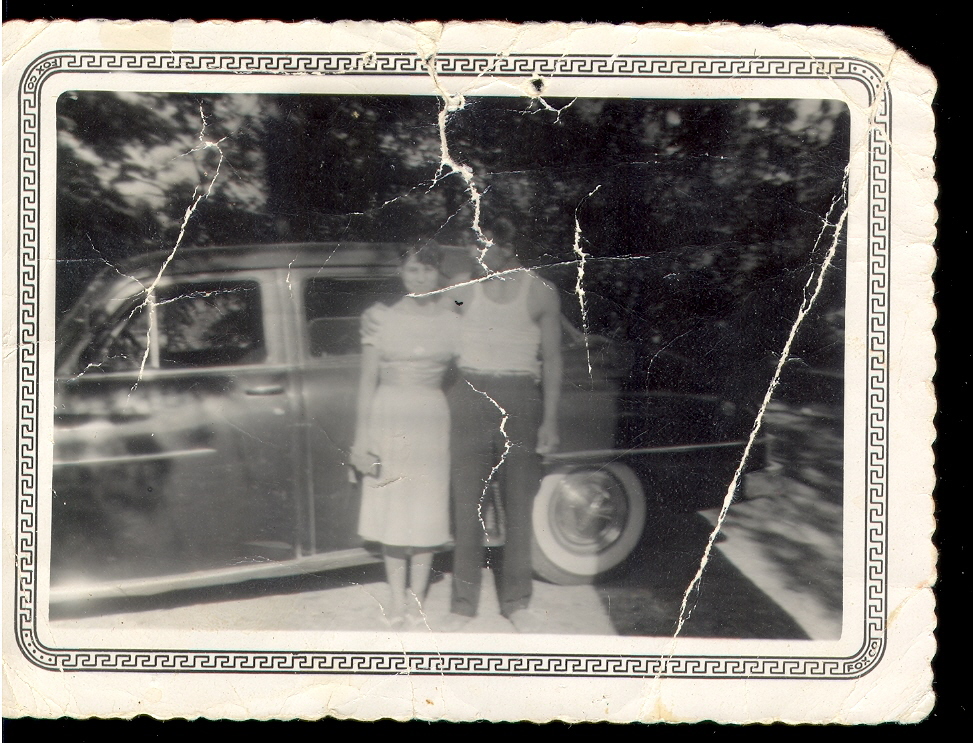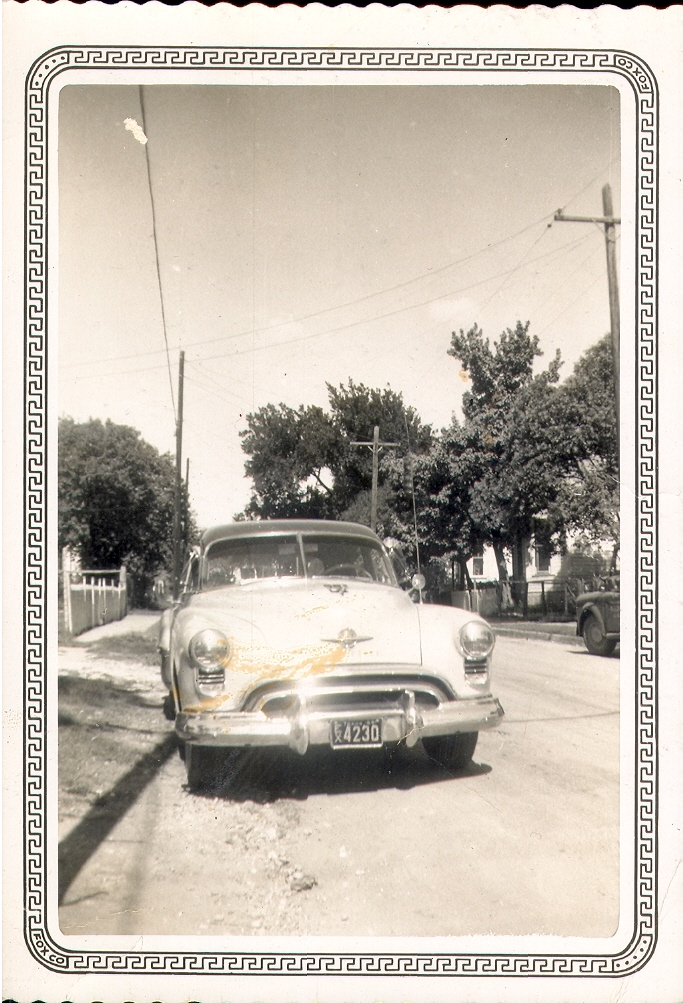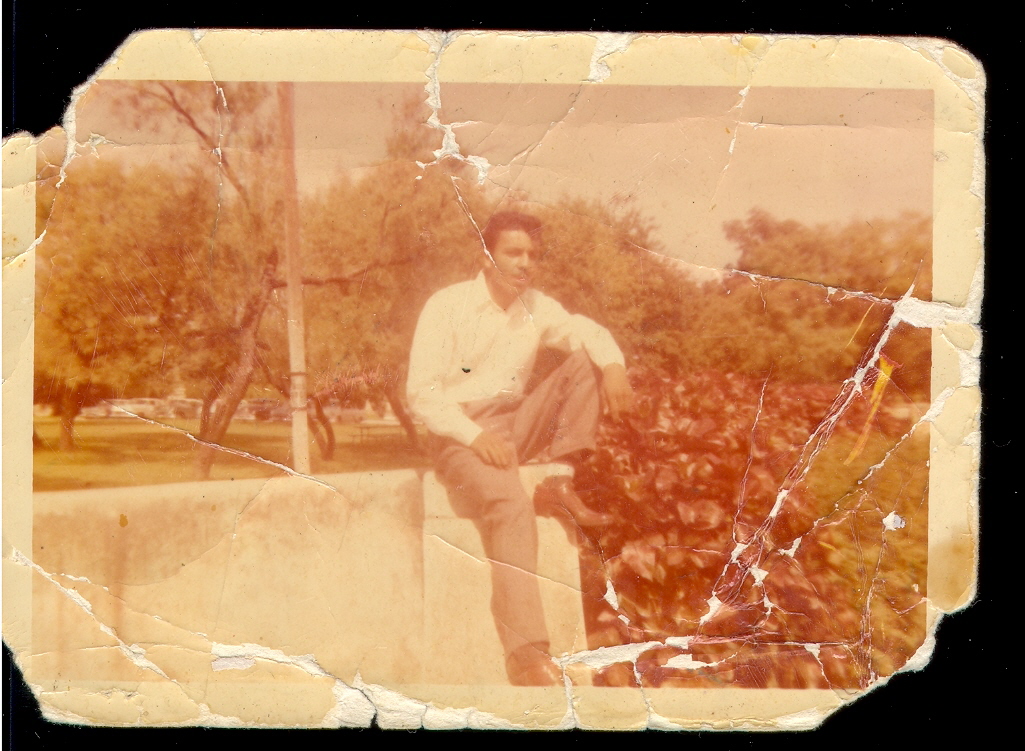Daniel Medrano Villarreal


Where are your parents from?
My dad, he was born in Guanajuato Mexico and he came over across the bridge and somehow he met my mom and they got
in love and they got married, he never went back to
Mexico.
Do you know what made your father come here to San Antonio?
For work.
What did your father do for a living?
Okay, he was landscaping and also would cover the lawns
and trimming and he was very dedicated at his job.
What about your mom? What did your mom do?
My mom, she worked in restaurants, different restaurants, a couple of bars (chuckle)
and she worked at this like a federal uh I don’t remember, they were doing
some job with bombs, you know at that time there was a war I think with Germany and she was
involved with my other aunts also working there and it was a very good job she had.
Does your father still have family in Guanajuato? Did you ever get to meet them?
No, I haven’t, he never talked about it and we never thought about asking. We were
all very young at that time you know.
At what age did you have to start helping around the house? What was your chore, how did you
help around?
Okay, I was very young say about seven-eight years old, I would shine shoes downtown
and then I would come home and help my grandma clean up around the house, I would save my
money I had made and I would enjoy the things that I would do,
which I hope it was all good. (chuckle)
Did you have A/C in your home? Did you have plumbing, electricity?
Yes we did have plumbing and electricity, but we didn’t have no A/C.
And did you have a refrigerator?
We had an icebox,
yeah and I used to carry ice in my bike, pretty big ice and it was
pretty hard work because I had to make sure that the ice was tied down and then I
enjoyed doing that also.
What was school like for you?
Okay, starting from first grade up to the ninth grade I was
always being there for other boys and girls. They would make
them cry and I was always sticking up for them. I wasn't always there to fight, but I would
care for other people and I always say "hey how come you make them cry"
and sometimes they’d pick a fight. I didn’t want to fight, but I had
to, to defend myself, and that’s the way I grew up in all schools that I went.
I always was called to fight because I would kind of stick up for the other person.
Was there a lot of discrimination at school?
Well I think there probably was because of the way the teachers would talk to me.
They would hit me in the head, they would say “you don’t learn, you hard head” and they would
embarrass me in front of my friends. It was true I guess that I wasn’t
learning because in math I would get up and go ask the teacher about a certain problem,
especially math, and I would get up again when I couldn’t solve the other problem and
I guess she got tired of me and she just came to my desk and say several things that
I didn’t like and that would cause me to copy. I came to be a copy-cat (laugh) I was
copying. I had a good friend of mine, he was good in math and all he used to do is
just finish his work and just pass it on, you know. I like to pass too, so that’s how
I went to high school to
Fox Tech High School
and I wanted to pass like anybody else
but I wasn’t really catching on in to the studies and from there in ninth grade I got
the idea about being a marine, that’s when I think I liked the Marine
Corps so I just retired after that out of high school and went up to the ninth grade
and I worked and I just uh fooled around if I could say that and I told my grandma
that I was gonna join the Marine Corps and I was sixteen years old, she wouldn’t sign
the paper cause I was too young and then seventeen, she still wouldn’t sign the papers but when
I was eighteen years old she said “I can’t stop you no more, you’re old enough to go to the
Marine Corps” and I was in for four years.


What made you get out of the Marine Corps?
Well (sigh) again there was prejudice, racial things, I love
the Marine Corps, I would rather stay there and make a career but I come back in my third
year there that I wasn’t making no rank, the paper or whatever, to do for advancement
I wasn’t getting you know, and I went to go talk to the General about it and he got real
mad and he hollered at me and everything and I asked him I said "sir I’m just here to ask you
how come I haven’t received my application that I made to be a coach", cause I had applied to
be a coach, so my application didn’t come in so I went ahead and asked for the General so they
let me see him but when I did go in there he was real, uh real mean, real uh aggressive and you
can’t talk back to a General ‘cause they’ll really get at you, so I went there, I’m trying to
be all nice and everything, and then he says “oh yes” he says “about your application, I was
cleaning my desk and I seen it and I tore it up and put it in the trash can”, so he say (laugh)
“get the “H” outta here” I just recall, so that, that really did it
as far as staying in the Marine Corps and there were other incidents that happened that I
couldn’t believe it and so finally after that I said that’s enough for me, but sometimes
I feel that this is a God given thing that happened because if I hadn’t gotten out of the
Marine Corps I wouldn’t have met my wife, I got out of the Marine Corps and I
wouldn’t be here with my friends and I wouldn’t met my wife and got married you know,
not right away, but you know (watery eyes)
So would you say that there was as much discrimination against Hispanics as there was for blacks?
Well blacks at that time, they weren’t even mentioned, they weren’t uh I’m not saying they
weren’t popular but we would never see them, not even in the papers and I mean they wasn’t,
I seen some discrimination in the Marine Corps but they’d get away with some things you know
like not marching right, and they wouldn’t get punished, they’d just laugh at them you
know ‘cause they were funny, they’d dance and all that and I didn’t notice the
difference between uh, I guess everybody just go along you know and but yes I noticed
in my lifetime I guess a lot of discrimination, makes it harder for everybody not
only the Hispanics but all races, we’re all facing the same consequences one day
of what were doing.
What was your first official job?
Okay, my first official job was, I started working with RC Cola,
I was there and It was
located at Josephine’s at that time and I enjoyed that job, it was a night time job and
I worked there real hard and again my friend recommended me to another better job that I
worked for Western Union and I
worked there, they would give me a lot of
Western Union
papers to deliver and at that time there was a lot of empty lots where
there’s no homes and I’d have to go across the trails to find the houses
at night and it was raining, sometimes it was cold and I would ride my bike. I was on my bike
and I learned to defend myself in a way because when they would send me real far away I
would chase 18 wheelers and I would hook up to the 18 wheeler (chuckles) and when they see
me through the mirror they would honk at me and I wouldn’t get off , they were going pretty
fast, I’m not saying about 70, 80 miles an hour but when they were going up hill and it was
hard for me to peddle so they would go to the side so I wouldn’let go and then I would hook
up on the other side and we’d have a lot of fun delivering my Western Union papers and
when I would go to the office without all those papers they’d say how come you come so
fast, you got a motorcycle or something and I wouldn’t tell them what I was doing but
I really learned how to find ways how to enjoy my work .
Do you remember how much you would get paid?
About $90 a week and at RC I was getting paid about $80 a week.
When did you buy your first car and do you remember how much it cost?
Okay I was sixteen years old (1951) and I paid $300.
Do you remember what kind of a car?

It was a 1941 Chevrolet, it was a sedan, I though it was a very beautiful car and I was able to pay cash for it ‘cause I was always saving money, I had a piggy bank and I was always feeding it with nickels and always saving it and I broke it up ‘cause it was full of money and it was exactly the amount of money that I had saved for the car. (chuckle) My uncle was the one that would take me around to find a car and he went to the north side and we turned, there was a filling station there and there was this 1941 car there and I just loved it, I seen it was parked in the back with big white wall tires and it had spoke hub caps on it and I said that’s the one I want.(chuckle) I had that car for a long time until I went to the service and I let my brother Larry take care of it and I was gone but he wrecked it about three times you know, one on each side and one in the back, he really totaled it out. And then I got that Oldsmobile, the one that you see in the picture.

When and where did you meet your wife?
I was living with my grandma on Laredo Street and she (Hortencia) was helping out our
neighbor across and one day I was coming from work and she came out, she’s sweeping, I don’t
know if she was doing it on purpose or what (laugh) and I seen her I said wooo (chuckle)
Then I asked my grandma "who’s she?" and my grandma “oh it’s Hortencia, she’s
a nice girl and she’s asking about you”, oh yeah? Okay, so we start, every time that
I come from work she’d come outside and then I’m there and I’m washing the car, that
’41 Chevrolet, and she came over outside and she said she could help me out, you know clean
the car, I said sure, so I got her to clean inside the car, she’d clean inside,
clean the windows, I would do the outside she would do the inside and so it was, we
called it love at first sight.
After that the lady that my wife worked for, she wanted me to take her for an errand to go see
her sister in the hospital and I asked the lady could we take her(Hortencia) and she said yeah
I’ll take her. So there we go, so I adjusted my mirror so I could see her (laugh) and
then when we got over there, the lady she worked for she asked her “do you want to go inside
with me” And she said no I’ll stay here, I said wow (chuckle) yeah, so you know we start
talking and later on I find out that her uncle is real mean, he wouldn’t let nobody talk to
her, so I said, "hey I’ll talk to your uncle and he won’t stop me" and I talked
to him and every thing and he let her go out dating

What kind of dates would you go out on?
Well we would go riding Brackenridge, seeing maybe the animals at the zoo you know,
uh maybe the Sunken Gardens, there was like a waterfall there, we took pictures of
that.
Do you remember how you proposed to her?
Well, I had to propose in front of her uncle, I had the engagement ring on layaway,
and I mentioned it to the uncle and he didn’t approve to it, but I had already put the ring on
layaway, it was more like "you like it or not" and then of course later on I brought
the ring over and I told him I needed, I got this proposal but no marriage and all that so we
just kept dating a little bit more and then finally went back and talked about marriage
and I talked to him again, he said no, not right now and I told him, I said
"either we get married or I take her with me" so he said no, and he still wouldn’t let me marry
her, I said okay, so one day I guess he probably got scared he said, okay go ahead, he
let her marry. So it was a Saturday, but the courts were closed so went to Seguin, so it was
not to much waiting I guess, kind of like that.
Is that the way it was in the past that you really had to ask permission from the father or
uncle instead of just asking the girl?
Yeah, it was more custom to ask the man in charge you know the dad, so it happened that
it wasn’t her dad this time it was her uncle, we really tried to do our best you know in
marriage, there were problems like in any marriage but we’ve been married for
47 years

And you have eleven children?
Yeah
And how many grandchildren?
About twenty seven, twenty eight. One’s on the way.
After you got married did you rent or own a place and how much did it cost?
We rented an apartment, it was about $200 a month.
What is the most important decision you ever made in your life?
In my life, the most important decision is to serve the Lord.
When did you do that and how did that affect your life?
I met this brother, Pete Martinez from another church and he invited me to church
and I went and I like it and then another good friend of mine Moses, and we went, both
of us and we accepted the Lord and then my wife, later on she came, and I changed
in my life , she also accepted the Lord. It’s a very wonderful way that we have learned to
live. We’ve been serving the Lord for now about 23 years and we just know that there
is no other way, this the best way you know.
Is there anything else you want to add?
Since a young boy I’ve always cared for people, boys and families and old
people, and people that are obese, I’m hoping one day I’ll be able to accomplish one of
my desires you know.
What desires are those?
Desires to reach out and help the young boys stay out of trouble
and have a better life as well as people that are obese and also to find a better way how to
help the Hispanic, they very much need God in their life. I haven’t been able to
do hardly nothing but my desire will always be with me. I’m very proud of my heritage, my race
and I feel that they need a lot of help and I realize there’s a lot of
help out there, but there’s other new things that got to be done to help out the
Hispanic.

.
RC Cola. Plano, Texas-based Cadbury Schweppes Americas Beverages (CSAB) is a subsidiary division of Cadbury Schweppes plc (NYSE:CSG). CSAB is one of the largest producers of soft drinks and premium beverages in the Americas. RC Cola is owned by Cadbury Schweppes. Daniel Medrano worked for RC Cola
Western UnionThe legacy of Western Union is as a telegraph company-sending messages to millions of people worldwide. Now primarily a financial services provider, the company continues to build upon its diverse 150-year history. Daniel Medrano worked for Western Union.
Fox Tech High School Fox Tech has advanced to recognized status based on the annual report card given by the state of Texas * Fox Tech is the only San Antonio ISD school to be a Texas School of Excellence and a National Blue Ribbon School. Daniel Medrano attended Fox Tech High School up to the nineth grade.
The Handbook of Texas Online. Copyright © The Texas State Historical Association. The Handbook of Texas Online is a multidisciplinary encyclopedia of Texas history, geography, and culture sponsored by the Texas State Historical Association and the General Libraries at University of Texas at Austin. http://www.tsha.utexas.edu/handbook/online/ Last Updated: May 16, 2005.
AIER Cost-of-Living Calculator. The calculator uses the Consumer Price Index to do the conversions. The source for the data is the Bureau of Labor Statistics. The calculator converts the cost of items in American dollars from 1913 to the present. Organized in 1933 as a private, independent, scientific, and educational charitable organization, the American Institute for Economic Research plans its research to help individuals protect their personal interests and those of the Nation. American Institute for Economic Research (AIER), P.O. Box 1000, Great Barrington, Mass 01230. http://www.aier.org/colcalc.html. (2005).